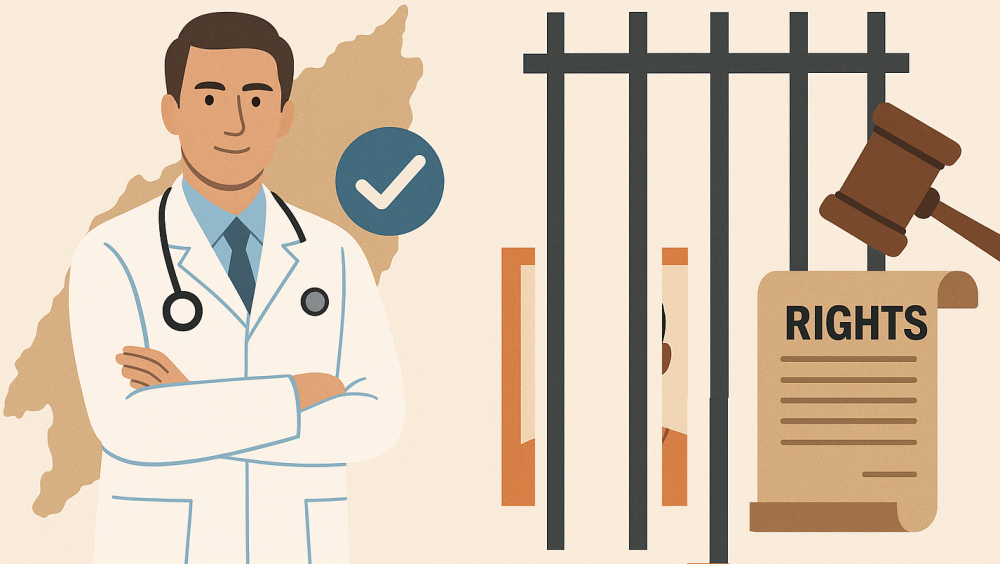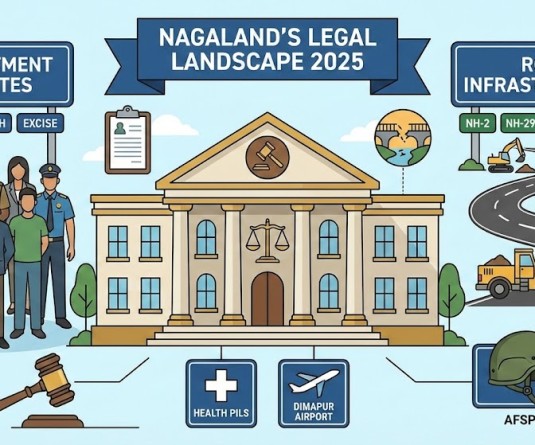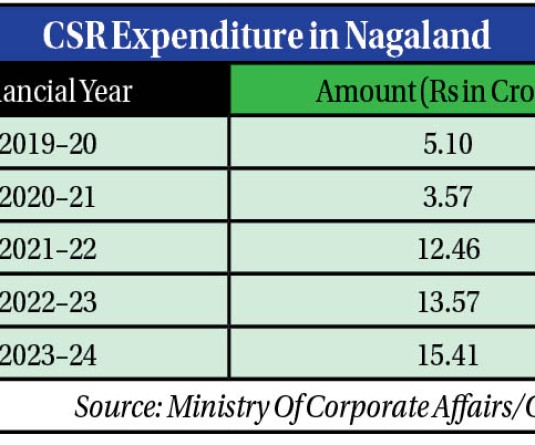
Moa Jamir
Kohima | August 12
The Kohima Bench of the Gauhati High Court has dismissed two separate writ petitions challenging the Nagaland government’s decision to regularise 98 in-service medical officers who had served during the COVID-19 pandemic.
Justice Yarenjungla Longkumer held that neither group of petitioners could be considered “aggrieved persons” under the law and that the State’s Special Recruitment Drive (SRD) was a reasonable, one-time policy decision taken under extraordinary circumstances.
The in-service medical officers were appointed during the COVID-19 pandemic struck in 2020 when the Nagaland government faced a severe shortage of doctors and State Cabinet approved the creation of new posts, including 44 medical officers, and combined them with existing vacancies to advertise 168 posts on August 4, 2020.
These appointments were made on a strictly temporary basis for one year or until regular recruitment by the Nagaland Public Service Commission (NPSC) and had carried no promise of regularisation.
Over time, as the pandemic continued, the Cabinet decided to recognise and retain those who had risked their lives in COVID duty. In May 2022, it resolved to hold a SRD giving weightage for COVID service and relaxing the upper age limit to 45.
When the NPSC declined to conduct the SRD, the Cabinet, in August 2024, approved a departmental screening process to regularise 98 in-service doctors, who were either appointed during COVID-19 or were contractual officers but were part of the pandemic response.
The decision was challenged by two sets of petitioners. The first were MBBS graduates, eligible for direct recruitment under the Nagaland Health Service Rules 2006, who argued that the Cabinet’s 2024 decision violated the statutory rules, which require all junior grade medical officer posts to be filled through 100% direct recruitment via the NPSC. They had not served during the pandemic.
The second sets of petitioners were from doctors who had been appointed during COVID-19 but later left government service to pursue postgraduate studies. They contended that having served over 100 days during the pandemic, they too should have been included in the SRD list.
Earlier, the Court had passed an interim order staying the process.
Locus standi and extraordinary situations
Hearings for the petitions were completed and judgment reserved on July 22, and delivered on August 1.
In the ruling, Justice Longkumer observed that the SRD was not a regular recruitment exercise open to all MBBS graduates, but a targeted, one-time policy aimed at a specific group of doctors who had served during the pandemic and were still on duty.
The Court held that the first set of petitioners, not having been part of this group, lacked locus standi and could not allege discrimination, as they were not “similarly situated” to the beneficiaries of the policy.
As for the second set of petitioners, the Court found that they were no longer in service and thus could not seek regularisation. The SRD’s purpose was to confirm the services of those still working in the health department, not to extend benefits to those who had resigned or left for studies.
The Court also noted that the earlier Cabinet decisions of 2020 and 2022 formed the policy’s foundation, and since these had not been challenged, the 2024 decision could not be attacked in isolation.
Citing Supreme Court rulings on judicial restraint in policy matters, Justice Longkumer said that “extraordinary decisions need to be taken to meet extraordinary situations.” The classification between those who had served during COVID-19 and those who had not, and between those still in service and those who had left, was based on a reasonable and identifiable criterion.
Finding no arbitrariness or discrimination in the State’s action, the Court dismissed both petitions, vacated its interim stay, and cleared the deck for way for the government regularisation of 98 shortlisted doctors.
It remains to be seen whether the petitioners will appeal the verdict before a Division Bench or pursue other legal recourse.
‘Grounds of detention must be provided in language accused understands’
In a separate ruling, the GHCKB Division Bench of Justices Susmita Phukan Khaund and Yarenjungla Longkumer on August 8 quashed the preventive detention of a woman held under the Prevention of Illicit Traffic in Narcotic Drugs and Psychotropic Substances Act, 1988 (PITNDPS Act), after finding that the authorities failed to furnish the grounds of detention in a language she could understand, in breach of Article 22(5) of the Constitution.
The detenue from Manipur was arrested in August 2024 in an NDPS case and remained in judicial custody when the State’s Special Secretary (Home) issued a detention order on December 12, 2024. she is currently lodged at District Jail, Dimapur.
The order was later confirmed and extended in March 2025.
Filing a habeas corpus petition, her sister argued that the order and grounds were provided only in English and not in languages she understood, breaching Article 22(5) of the Constitution.
The plea also argued that the order failed to record any likelihood of her being released on bail and reoffending, as required under Supreme Court precedent in Huidrom Konungjao Singh.
The State countered that the order was lawfully issued, that all procedures under Section 3(2) of the Act were followed, and that the grounds were explained to the detenue in Nagamese, which she understood. However, the Court, citing other apex court’s rulings, held that oral explanation alone did not meet the constitutional requirement.
It further held there was “not even a whisper” in the detention order or grounds about the detenue’s judicial custody, likelihood of release on bail, or the possibility of her reoffending, omissions that the Supreme Court has held fatal to preventive detention orders.
Thus, the Court declared that Detention Order of 12.12.2024 and the Confirmation Order of 12.03.2025 “cannot stand the test of law” and accordingly, set aside and quashed both.
Reserves judgement on NEET selection case
The Court on August 12 also concluded the hearing of a writ petition concerning the NEET-UG 2025 selection process in Nagaland and reserved the judgement for delivery on August 14.
“Hearing concluded, let this matter be listed for delivery of judgment on 14.08.2024,” stated the oral order issued by Justice Mridul Kumar Kalita, after hearing submissions from the petitioner as well as State respondents, including the Nagaland Advocate General, for two consecutive days.
The case challenges the State Common Selection Board’s merit list for the Nagaland State quota, alleging wrongful exclusion despite the candidate securing the second-highest score in the National Eligibility-cum-Entrance Test for Undergraduates (NEET-UG) for the Academic Session 2025-26. The NEET-UG is the nationwide examination for admission to undergraduate medical courses such as MBBS and BDS in India.
The petitioner, whose father is a Colonel posted at NCC Group HQ Kohima, claimed that under long-standing central policy, children of Central and State government employees posted in Nagaland should be treated at par with local residents.
She argued that her exclusion was based on a 2021 State notification requiring Category III candidates to have studied Class X/XII in Nagaland and for parents to have resided in the State for at least three years. The criteria were not adequately publicised and conflict with central guidelines, she contended.
On July 28, the court allowed her to participate provisionally in NIMSR counselling and asked the authorities to explore keeping one seat vacant pending the petition’s disposal.






